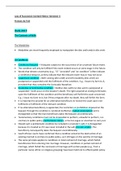Summary
Summary PVL2003 (Law of Succession) Semester 2 Notes
- Course
- Institution
This is a complete, comprehensive, and understandable summary for semester 2 of the PVL2003 - Law of Succession course. It includes content notes, covering study unit 9 to study unit 13, as well as additional notes taken during lectures. The summary contains everything you need to know to get throu...
[Show more]



